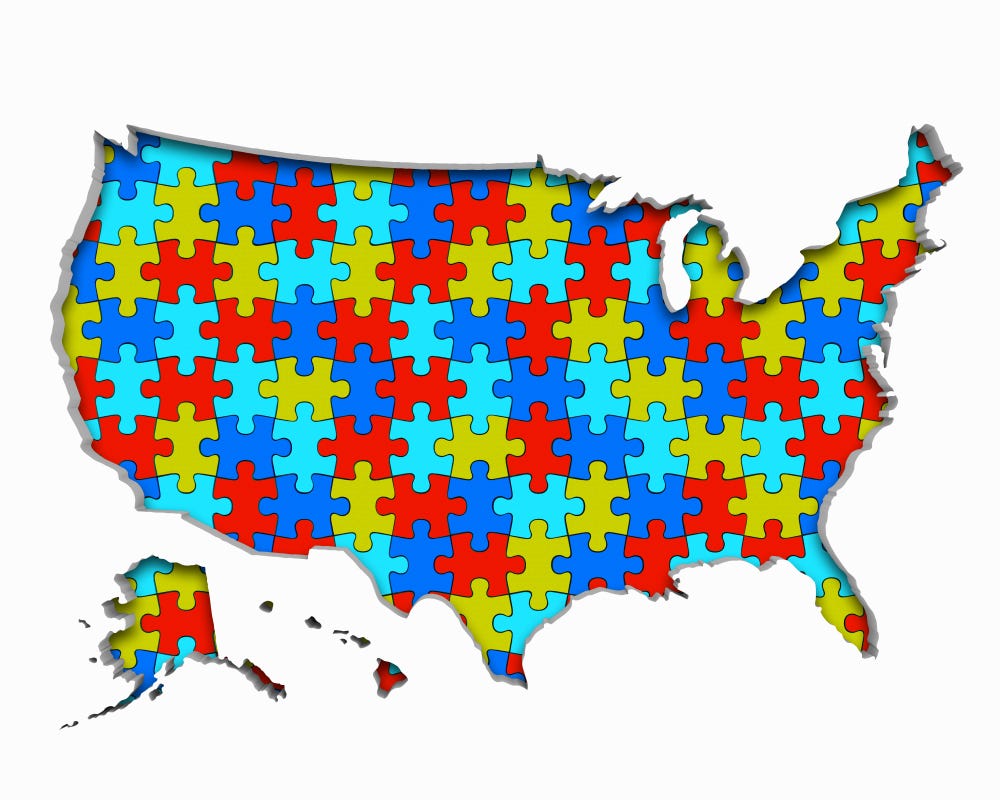E-Pluribus | February 4, 2022
Just say no, are there worse things than gerrymandering, and what is and isn't 'book banning'.
A round up of the latest and best writing and musings on the rise of illiberalism in the public discourse:
Charles C. W. Cooke: The Power of ‘No’
Ado Annie of Oklahoma! fame could use this latest bit of advice from Charles C. W. Cooke at National Review, but there’s a lesson for the rest of us, too. While there are many factors driving the cancel culture phenomenon, Cooke suggests that much of it could be shut down if more people made use of one simple two-letter word: no.
It is customary for commentators to describe the practitioners of America’s cancel culture as hypersensitive “snowflakes” who, having been stuck in perpetual adolescence, are unable to cope with the rigors of adult life. Increasingly, though, this seems naïve. These people aren’t snowflakes; they’re vicious, self-interested powerbrokers who have discovered that, by reciting a handful of carefully chosen words, they can exile their opponents for good. Used often enough — and widely enough — “No” helps to smash this expectation. Responding to the pressure campaign against Ilya Shapiro, William Treanor, the impotent dean of Georgetown Law School, said, “I have heard the pain and outrage of so many” and confirmed that he was “grateful to the many members of the community who have reached out to me and other leaders at the school to share their thoughts.”
What Treanor should have said instead is: “No.”
Happily, the word is available to everyone — and it’s free. It’s available at the Disney Corporation, where it should have been used to defend Gina Carano. It’s available at the New York Times, where it should have been used to defend Donald McNeil. It’s available at Teen Vogue, where it should have been used to defend Alexi McCammond. It’s available across corporate America, which seems not yet to have realized that its problems stem almost exclusively from its habitual inability to make a stand in the face of increasingly preposterous demands. And here’s the best part: The more often it is used, the less often it ends up being needed. Bit by bit, and use by use, the word diminishes the requests it is used to repel. One might think of its utilization as a lockdown strategy: Fifty Nos to stop the spread.
Read it all here.
Christian Schneider: Don’t Like Gerrymandering? Be Wary of the Alternatives.
It has been said that democracy is the worst form of government except for all others. Christian Schneider at The Dispatch submits that the same sentiment could be said about legislative districts and gerrymandering. While incumbents can use reapportionment to firm up their party’s position, it doesn’t always work, and Schneider says the alternatives have their own set of problems.
The problem, of course, is that “nonpartisan” boards are never devoid of politics. When California enacted a nonpartisan redistricting board, it didn’t take long for it to come under attack for overt partisanship.
Attorney Rick Esenberg put it well here:
"Non-partisan" solutions rarely remain non-partisan and often succeed only in driving the politics underground. It is notoriously difficult to drive the politics out of something that is inherently political.”
The other relief Democrats seek is for courts to micromanage the reapportionment process, a power which is explicitly given to legislatures in the U.S. Constitution. Democrats argue gerrymandering is a violation of their 14th Amendment protections, as packing people into like-minded districts dilutes their “one person, one vote” rights.
Thus, the maps have been challenged on partisan grounds, even though such partisanship has never been the basis for a successful challenge in the U.S. Supreme Court. Allowing challenges to partisan apportionment demands that judges all over America suddenly become political pundits, determining which candidate should "rightfully" win each legislative seat in every state.
Fortunately, in 2019, the U.S. Supreme Court rejected a lawsuit seeking to strike down partisan redistricting, deeming it outside their purview.
"We conclude that partisan gerrymandering claims present political questions beyond the reach of the federal courts," Chief Justice Roberts wrote for the 5-4 conservative majority. "Federal judges have no license to reallocate political power between the two major political parties, with no plausible grant of authority in the Constitution, and no legal standards to limit and direct their decisions."
Read the whole thing.
Ernest J. Zarra, III: Graphic Content Restrictions Are Not Book Bans
Censorship is a sensitive topic, and book banning (and burning) is often a hallmark of oppressive regimes. Applying this label to the process of shelving (or more to the point, unshelving) library books, particularly in the context of young children, can be a distortion of the normal process of determining appropriateness, says Ernest Zarra at Minding the Campus.
A January 2022 Education Week article highlighted a growing battle between parents and school librarians. The librarians believe that conservative parents are waging an increasingly hostile war on books, and they are adamant about not “banning” any texts. Parents are equally as adamant about removing books with graphic sexual content.
How do the librarians’ arguments fare elsewhere in schools and in the outside world? For example, when schools restrict what students are allowed to eat from district-provided meals, they are not “banning” school lunches. Students can go elsewhere and find what is restricted. Likewise, physicians who place people on restricted diets are not “banning” food from patients. Disgruntled patients can shop around to find a doctor more to their liking, or they can disregard dietary restrictions altogether. Business owners who restrict patrons from entering their establishments risk losing customers, but they are not “banning” patrons. Similarly, when school districts restrict offensive content in their libraries, they are not “banning” books. This could not be any clearer.
[…]
People have strong opinions on this issue, and mine are no exception. Indeed, people often use hyperbole to advance a narrative and gain emotional traction with over-the-top claims. This seems to be the case when librarians claim that parents want to ban books. The real struggle is a cultural one, and children are again in the middle of it. There is a moral and spiritual assault on American families that has all the earmarks of a usurpation of parental authority. This assault is not only about graphic sexual content in reading material, but also over lifestyles pertaining to sex, gender, and race. What are parents to do about this?
Read it all.
Around Twitter
A thread from Shadi Hamid on “wokeness” and medical care rationing:
Via the Foundation Against Intolerance & Racism (FAIR), a related story out of Utah:
Glenn Loury on the Supreme Court as a “representative” institution:
And finally, David French on censorship:










